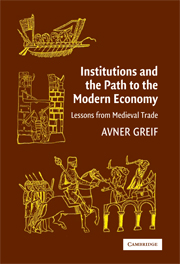Book contents
- Frontmatter
- Contents
- Abbreviations
- Preface
- I Preliminaries
- 1 Introduction
- 2 Institutions and Transactions
- II Institutions as Systems in Equilibria
- III Institutional Dynamics as a Historical Process
- IV The Empirical Method of Comparative and Historical Institutional Analysis
- V Concluding Comments
- Appendixes
- References
- Index
- POLITICAL ECONOMY OF INSTITUTIONS AND DECISIONS
1 - Introduction
Published online by Cambridge University Press: 05 September 2012
- Frontmatter
- Contents
- Abbreviations
- Preface
- I Preliminaries
- 1 Introduction
- 2 Institutions and Transactions
- II Institutions as Systems in Equilibria
- III Institutional Dynamics as a Historical Process
- IV The Empirical Method of Comparative and Historical Institutional Analysis
- V Concluding Comments
- Appendixes
- References
- Index
- POLITICAL ECONOMY OF INSTITUTIONS AND DECISIONS
Summary
On March 28, 1210, Rubeus de Campo of Genoa agreed to pay a debt of 100 marks sterling in London on behalf of Vivianus Jordanus from Lucca. There is nothing unusual about this agreement – in fact, there is evidence of thousands of such agreements in Europe at the time. But this agreement implicitly reveals why Rubeus lived in a period of remarkable economic growth measured by such proxies as urbanization, population growth, capital investment, and changing patterns of trade.
First, this agreement reflects well-functioning markets. The institutional foundations of these markets were such that merchants trusted agents to handle their affairs abroad, even without legal contracts. Impersonal lending among traders from remote corners of Europe prevailed, and property rights were sufficiently secure that merchants could travel abroad with their riches. Second, it reflects well-functioning polities. The institutional foundations of polities throughout Europe during this time induced policies that were conducive to economic prosperity. Rubeus made his agreement in the Republic of Genoa, which had been established about a century earlier but had already pursued policies that made it a bustling commercial center. To understand why and how such well-functioning markets and polities came about in various historical episodes and what led to their persistence and decline, we have to study their institutional foundations.
Studying institutions sheds light on why some countries are rich and others poor, why some enjoy a welfare-enhancing political order and others do not. Socially beneficial institutions promote welfare-enhancing cooperation and action.
- Type
- Chapter
- Information
- Institutions and the Path to the Modern EconomyLessons from Medieval Trade, pp. 3 - 28Publisher: Cambridge University PressPrint publication year: 2006
- 1
- Cited by



